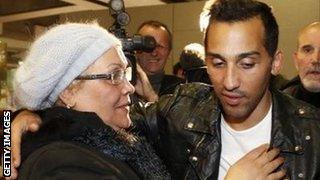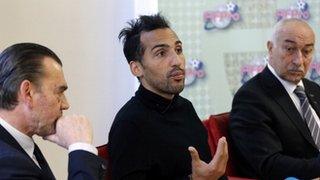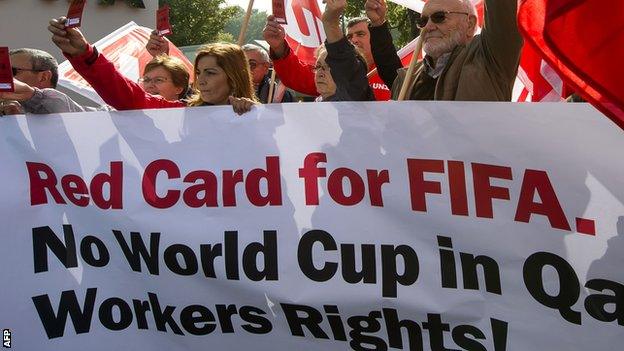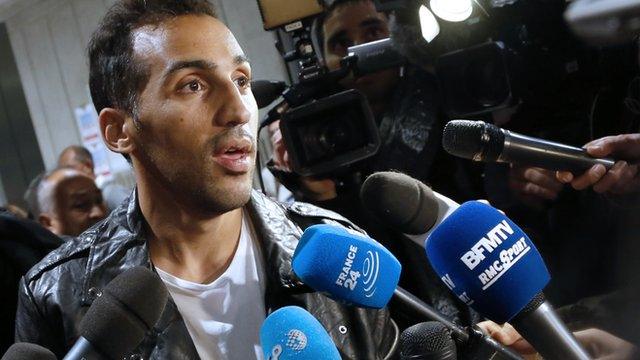Trapped Zahir Belounis planned to escape from Qatar before release
- Published
'Trapped' footballer thanks Wenger
Zahir Belounis had reached breaking point when the call finally came.
The 33-year-old French-Algerian footballer had hatched an incredible plan to escape Qatar illegally, considered suicide and then turned to alcohol to maintain his crumbling sanity but at 2pm last Wednesday, the news he had been waiting 19 months for finally arrived. He was free.
"The voice said, 'tomorrow you have to leave. You have an exit visa,'" he says, before a smile as wide as the Seine spreads over his face.
As we stand on a balcony overlooking Paris, lit by warm winter sunshine, there is a sense that Belounis still can't believe what has happened.
He had spent most of the past two years fighting a battle to free himself from Qatar after a dispute over unpaid wages with El Jaish, the club he captained to silverware.
During our interview he recalls the battle he fought against the authorities in Qatar, talks about his darkest moments and explains why he is still willing to support the 2022 World Cup in Qatar despite his ordeal.
"They have destroyed my life," he says. "By the end I was crying every day. When you think about suicide and killing yourself, it is difficult."
Qatar's controversial employment laws had trapped Belounis in the country against his will. Every foreign worker is bound to their employer. They are not allowed to leave their job, or even leave the country to go home, without their permission. It is known as the Kafala system.
Belounis, along with thousands of others, have fallen foul of it. When the footballer stopped receiving his wages he wanted to know why. He took the dispute to court. In return, his club refused to grant him an exit visa. The club refused to comment when contacted by the BBC.
"I still don't know who made the decision to free me," he says. "All I know is that when I got the call I grabbed my wife and my two daughters and we went to the airport.
"I will never forget that 24 hours. I didn't sleep. I held my daughters close. It was so intense and I didn't believe I would really get out, even as I went to the airport. I didn't believe it until I heard the noise of the stamp. When I heard that, I knew I was free."
Belounis has been back in Paris for six days when we meet near the Champs-Elysees. We have spoken frequently over the past week. His wife Johanna picked up the phone on Wednesday, her children could be heard in the background - home, happy, normal, ready for Christmas.
And yet there has been no time for parties or celebrations. When Zahir has not been with his family, he has been telling his story, spreading the word, fighting for those who remain in Qatar. He remains too humble to see himself as a symbol for those left behind. But that is the reality.

Zahir Belounis was met at the airport by his mother
He says he had planned to flee Qatar illegally and be home for Christmas, whatever the consequences. He had laid out a plan. He could no longer go on.
"What nobody knows was that I prepared an escape," he says. "I will not say how I was going to do it, because I don't want to give bad ideas to some people. But I had taken that decision. I had no chance. I said 'I will be home before Christmas'. That was the choice I made."
When asked about the moments he considered suicide, he finds it hard to explain how and why he reached rock bottom. "My brother and friends will tell you I am a strong man," he says.
"But after this fight I had no choice. The only way I was able to stop doing something bad to myself was to drink. Alcohol was a help to me, I thought about something else until the morning. It was the only way I had."
Human rights issues continue to embarrass and undermine Qatar's attempts to win over a sceptical football public, but Belounis does not want to see the World Cup taken away from the Gulf state.
He sees the tournament as an opportunity to change the country for the better and tackle the problems that bubble away under the surface.
Last month, Amnesty International produced a report that claimed workers were being treated like cattle. Others have likened the Kafala system to modern-day slavery. Belounis says his story is not unusual in Qatar.
"There are people suffering there, they need to change the [working] rules," he says. "Everybody in Qatar is happy they have the World Cup. But change the rules. Maybe the government didn't know about this. But I will tell you, there are people suffering a lot. They need help."
Belounis is already seeing the wider issues. There is no bitterness towards Qatar as a country, only the club and those who "destroyed" his life. He says, rather incredibly, that he would be willing to act as an ambassador for the Qatar World Cup if the Kafala system is scrapped.

Belounis does not expect to play professional football again
"I heard that maybe Qatar will change the rules for footballers and maybe they will cancel the Kafala system. But for me, the value of a football player and a worker is the same. If you cancel the system for a football player, you need to cancel it for everybody," he says.
"Qatar will host something amazing. It will be like no World Cup we have seen before. I wish all the best for the Qatari people. But I tell you my life was a disaster, I did nothing wrong. But the system destroyed me, it destroyed me."
Belounis still harbours hopes of returning to training with a club in France, but deep down he believes his experiences in Qatar have ended his playing career.
"Now I have to spend some time with my family, I don't believe someone will say 'Zahir come and train again'. I don't believe the story will come full circle, but it would be nice."
If nothing else the story of Zahir Belounis is a cautionary tale.
He is not, despite his experience, willing to cast Qatar as the bad guys, as a nation unfit to host a World Cup.
What he sees is an opportunity, a chance to make a lasting change, a chance to help others avoid falling into a trap.
He concludes: "I have come back home to my mother at the age of 33 years with nothing. But what is important is the future. Qatar needs to change."
- Published27 November 2013

- Published3 December 2013

- Published26 November 2013

- Published6 December 2013

- Published7 June 2019
